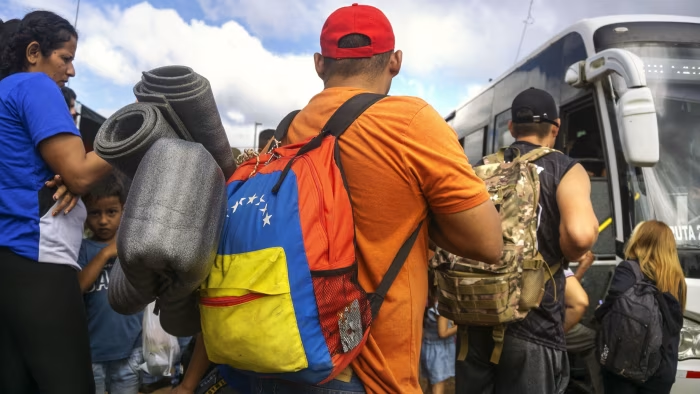Donald Trump’s crisis negotiator, Richard Grenell, has traveled to Venezuela to meet with its leader, Nicolás Maduro, to discuss a deal on migrants. This move has raised concerns among Venezuela’s opposition, who fear it could strengthen Maduro’s authoritarian regime.
Grenell, a close ally of Trump, arrived in Caracas on Friday to push Maduro to accept thousands of Venezuelan migrants deported from the U.S. “without conditions,” according to U.S. officials. The visit comes just before Secretary of State Marco Rubio plans to tour Latin America to show renewed U.S. interest in the region.
Maduro, who has faced international criticism for his disputed 2023 election win, signaled his willingness to talk with Trump’s team. Russia, a key supporter of Maduro, sent a government plane to Caracas just before Grenell’s arrival, highlighting the geopolitical stakes.
Mauricio Claver-Carone, the U.S. special envoy for Latin America, stated that Trump expects Maduro to take back Venezuelan criminals and gang members deported from the U.S. “unequivocally and without condition.” However, details of the talks remain unclear.
A potential deal could involve the U.S. easing sanctions on Venezuela, dropping a reward for Maduro’s capture, and allowing more Venezuelan oil to flow to U.S. refineries. In return, Venezuela would take back thousands of its migrants and release U.S. citizens detained in the country.
Maduro, backed by Russia and Iran, has been isolated by much of the West and Latin America since his controversial re-election. The Biden administration and European Parliament have recognized opposition leader Edmundo González as the legitimate president.
Rubio and Claver-Carone, both known for their tough stance on Venezuela, have opposed deals with Maduro in the past. However, it’s unclear if their views will influence Trump’s approach. Claver-Carone emphasized that the U.S. demands are not part of a negotiation but warned of “consequences” if Maduro refuses to cooperate.
Grenell, who has previously met with Maduro’s top aide, Jorge Rodríguez, tweeted that “diplomacy is back” and described talks as a “tactic.” Meanwhile, the Venezuelan opposition has urged Trump not to strike a deal with Maduro, fearing it could undermine their fight for democracy.
Opposition sources worry that U.S. business interests might push Trump to prioritize access to Venezuela’s vast oil reserves over human rights concerns. Trump’s focus appears to be on reducing migration, as he recently revoked temporary protected status for 600,000 Venezuelan migrants in the U.S.
During Trump’s first term, his administration imposed strict sanctions on Venezuela and recognized opposition leader Juan Guaidó as the legitimate president. However, Maduro remained in power with support from Russia, China, and Iran, while Guaidó fled to Florida.
A former Trump official noted that the president sees the Venezuelan opposition as “losers” and is unlikely to support them again. Instead, Trump’s priority seems to be addressing migration and securing a deal that benefits U.S. interests.
What do you think about the U.S. negotiating with Venezuela’s Maduro? Should human rights concerns take priority over migration and oil deals?

